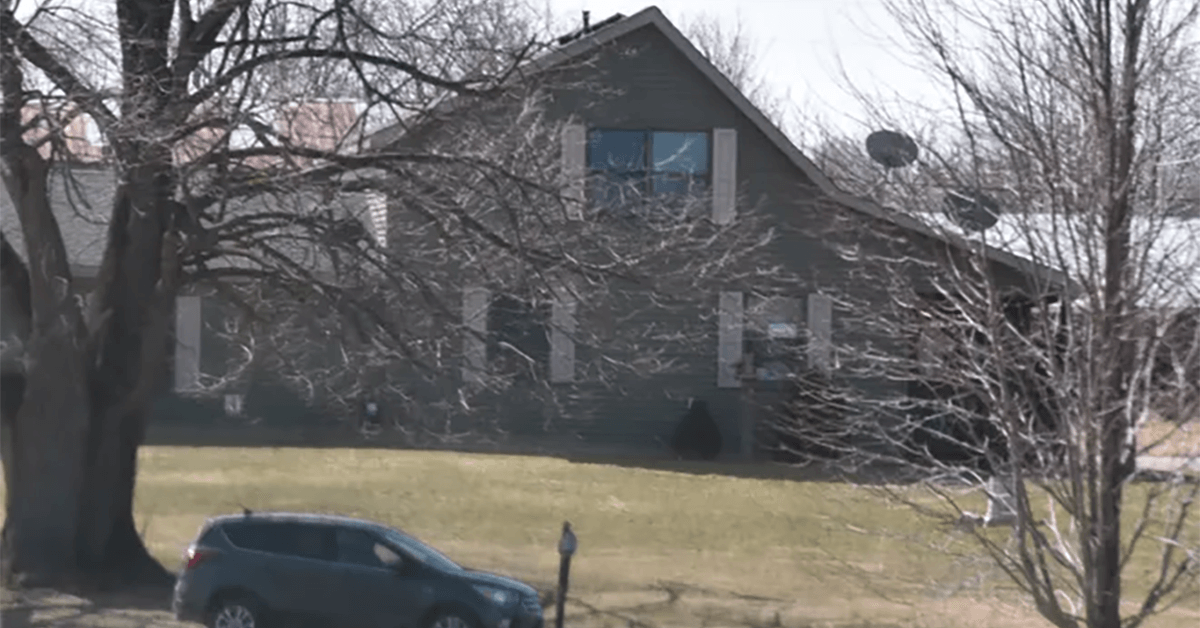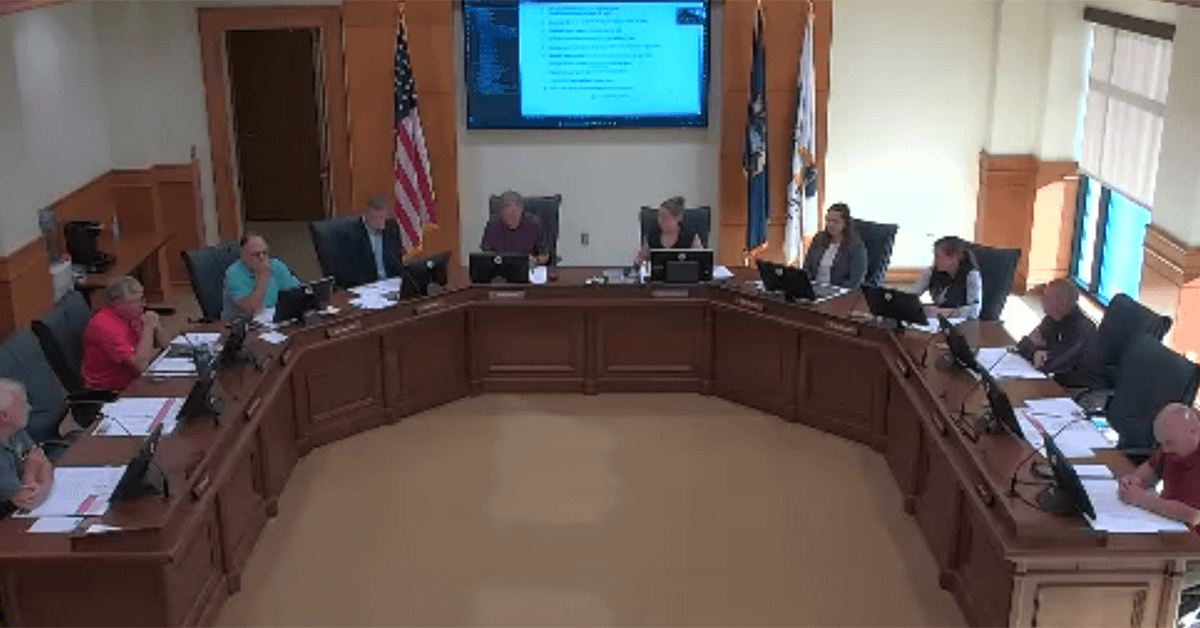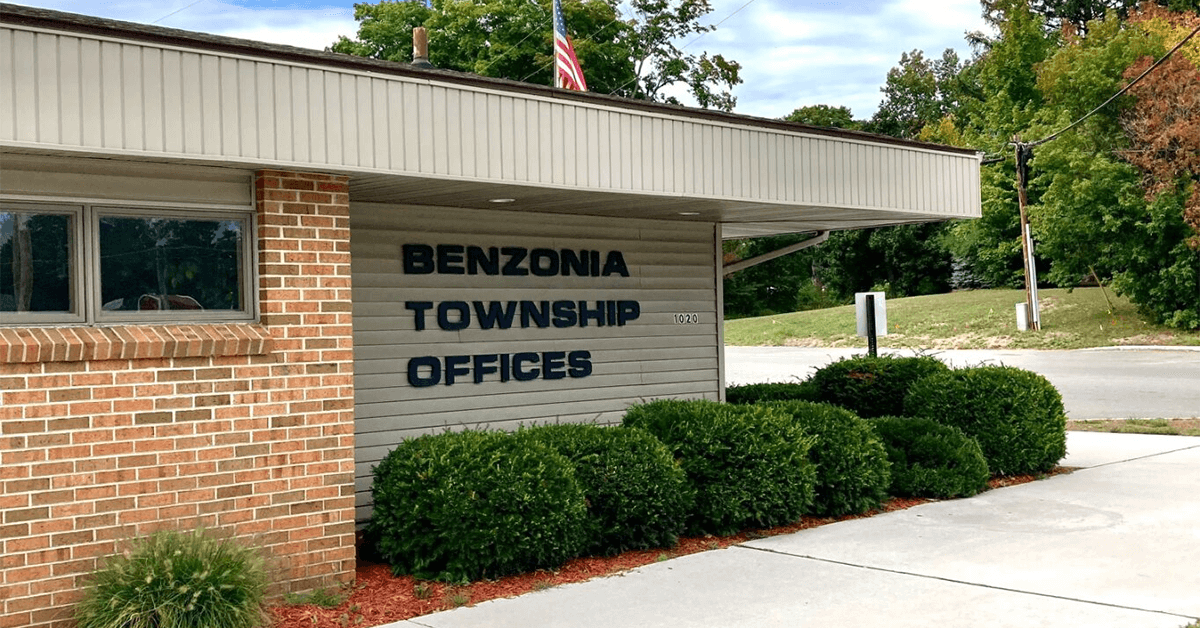Federal Prosecutors Move to Seize Rick Johnson's Property Over Bribery Debts

Federal prosecutors are aiming to seize 40 acres of hunting property owned by former Michigan House Speaker Rick Johnson to settle a debt arising from his involvement in a significant bribery scheme. Johnson, who accepted more than $110,000 in bribes, was found to have manipulated the state's cannabis industry licensing process for personal gain.
On Tuesday, the U.S. Attorney's Office in Grand Rapids submitted a request to have Johnson's land in LeRoy, Michigan, approximately 15 miles south of Cadillac, forfeited to the government. This move comes after Johnson failed to pay a $110,200 judgment related to the most substantial public corruption scandal in Michigan's capital in three decades.
This legal action coincides with efforts by prosecutors to keep Johnson incarcerated. Johnson has petitioned U.S. District Judge Jane Beckering for a compassionate release, citing health issues. However, Johnson has only served less than 20% of his 55-month sentence and is not due for release until July 2027. Prosecutors have countered Johnson's request, arguing that he is healthy enough to walk up to eight miles daily at a minimum-security federal prison in Duluth, Minnesota.
"Johnson should serve his entire custodial sentence as punishment for his crime and to send a strong deterrent message to all public officials that bribery results in a meaningful deprivation of liberty," wrote Assistant U.S. Attorney Christopher O'Connor in opposition to Johnson's release. "The rule of law demands it."
At sentencing, Judge Beckering described Johnson's actions as an "unfettered abuse of power," stating that he exploited his official position for personal enrichment, including cash payments, free meals, and sexual favors. Court documents revealed Johnson had numerous encounters with a sex worker who referred to him as "Batman."
Johnson, along with three other individuals—cannabis industry lobbyist Vince Brown, Oakland County businessman John Dawood Dalaly, and Lansing lobbyist Brian Pierce—were convicted in connection with this bribery scheme. Johnson was implicated in accepting bribes while heading a state board responsible for determining which businesses would gain early entry into Michigan's burgeoning medical cannabis market.
In addition to his prison sentence, Johnson was ordered to forfeit the value of the bribes he received. "Despite due diligence, the government has been unable to locate the $110,200 in illicit proceeds received by [Johnson] to satisfy the money judgment," Assistant U.S. Attorney Daniel McGraw wrote in the recent filing.
However, investigators have identified a 40-acre parcel of land in LeRoy owned by Johnson through a limited liability corporation, Common Cents Harvest Farms. This land is situated about nine miles from Johnson's farm in LeRoy. Authorities discovered this property as Johnson was nearing sentencing last year. Deputy U.S. Marshal Jesse Lake found that Johnson had acquired the property in December 2009 via a land contract with Greenstone Farm Credit Services, which had taken possession of the land for $32,500 through a sheriff's deed a year earlier. Currently, the undeveloped land is valued at $124,000, according to Osceola County property records.
The investigation revealed that Johnson's wife, Jan Johnson, had attempted to sell the property to satisfy the money judgment, but was unsuccessful. Given the property's estimated value, prosecutors believe that forfeiting the land could potentially cover the entire amount owed by Johnson.
Jan Johnson did not immediately respond to a request for comment on Tuesday.
Proposed Changes to Coldwater's Cannabis Grow Regulations

A public hearing is scheduled for the next Coldwater Planning Commission meeting to discuss the potential removal of cannabis grow establishments from the special land use approval process in the city's industrial zones. The hearing will take place on October 7th, following the Commission's consensus on Monday night to move forward with the proposal.
Discussions around this potential policy change have been ongoing for nearly two years. Currently, both grower and excess grower licenses are permitted in areas zoned D-2 Heavy Industrial, contingent upon special land use approval. Similarly, cannabis microbusinesses require special land use approval to operate in C-4 General Business zones.
Since May 2021, four special land use requests have been approved, but only one business, Craft Leaf LLC at 211 West Garfield Avenue, has obtained both state and city licenses, according to City Manager Keith Baker. No applications for microbusinesses have been submitted or approved to date.
City Attorney Amanda O'Boyle clarified that the proposed changes would not affect Craft Leaf LLC. In her memo to the Planning Commission, she suggested including a sunset provision that would classify any pre-existing cannabis grow licenses within the D-2 District as legal non-conforming uses after a specified date. O'Boyle also noted that the provision allowing cannabis retailers as an accessory to grow operations and processors remains intact.
Michigan Cannabis Market Breaks Records with $295 Million in August Sales

Michigan's cannabis market experienced unprecedented growth in August 2024, reaching record sales of $295.4 million. This milestone signifies the state's position as a leading player in the national cannabis industry, driven by a combination of factors such as regulatory support, market expansion, and a resilient consumer base.
Regulatory Framework and Market Expansion
Michigan's regulatory framework has been instrumental in creating a mature and competitive cannabis market. The state's Cannabis Regulatory Agency (CRA) has implemented policies that encourage business growth and consumer safety. A streamlined licensing and permitting process has enabled businesses to meet the rising demand efficiently, fostering a market environment conducive to both competition and innovation.
The continued expansion of dispensaries across the state has also played a crucial role in driving sales. With 8.7 dispensaries per 100,000 people, Michigan far surpasses California's 3.2 dispensaries per 100,000, making it more convenient for consumers to access legal cannabis. This ease of access has been further bolstered by the diversity of product offerings, including flower, concentrates, vape cartridges, and edibles, catering to a wide range of consumer preferences.
Market Resilience Amid Regional Changes
Despite the launch of recreational cannabis sales in neighboring Ohio on August 6th, 2024, Michigan's market showed remarkable resilience. Rather than experiencing a decline, Michigan's sales continued to soar, demonstrating the strength of its established market. Factors contributing to this resilience include Michigan's loyal customer base, well-established market presence, and a diverse product range. Additionally, the state's relatively lower 16% tax on cannabis sales compared to California's 35%-45% has made legal cannabis more affordable, drawing more consumers into Michigan's market.
Sales Breakdown and Pricing Trends
August's record sales marked the third consecutive month of growth, with a 2.7% increase over July's $287.7 million in sales. Adult-use sales dominated the market, accounting for over $294.1 million, while medical cannabis sales made up less than 1% at $1.3 million. Year-over-year, August 2024 saw a nearly 7% increase in sales compared to August 2023, when total sales were $276.3 million.
One notable trend in the market is the declining price of cannabis flower. In August, the average price per ounce for adult-use flower was $80.14, nearing a record low. This decline in price is partly due to the increasing supply, with Michigan dispensaries selling a monthly record of 100,894 pounds of flower in August. The average price per pound stood at $1,282, a slight 0.6% increase from July but a 15% decrease from August 2023. With the outdoor harvest season approaching in October, prices may decrease further, potentially fueling additional sales growth.
Sales Composition and Consumer Preferences
Flower remains the dominant product category in Michigan's cannabis market, accounting for 44% of retail revenue in August. Concentrates, vape cartridges, and infused edibles followed, making up 19.6%, 18.5%, and 9% of sales, respectively. This diverse product landscape caters to varying consumer preferences, contributing to the market's sustained growth.
Projections and National Comparisons
Michigan's cannabis market is on track to surpass $3.32 billion in total sales for 2024, an 8.6% increase from the $3.06 billion recorded in 2023. The state is also projected to sell nearly 1.1 million pounds of adult-use flower by the year's end, representing a 12.8% increase from 2023. These projections highlight Michigan's rapid growth and position it as a formidable competitor to larger markets like California.
California, with nearly four times Michigan's population, is expected to finish 2024 with $4.75 billion in total cannabis sales. However, California's market has faced its third consecutive year of decline due to limited access to licensed dispensaries, high taxation, and complex regulations. In contrast, Michigan's more accessible market and lower tax rates have driven per capita sales to roughly $330 per year, compared to California's $120.
Conclusion
August 2024 marks a significant milestone for Michigan's cannabis industry, with record sales reflecting the state's thriving market. Michigan's success can be attributed to its robust regulatory framework, expanding market presence, consumer trust, and competitive pricing. As the state continues to innovate and expand, its cannabis market is poised for further growth, setting an example for other states in the evolving landscape of the cannabis industry.
Judge Removes Cannabis Ban Proposal from Benzonia Township Ballot

A court order has led to the removal of a ballot proposal aimed at banning adult-use cannabis establishments in Benzonia Township. The proposal asked voters whether the township should pass an ordinance prohibiting adult-use cannabis businesses, referencing provisions in the Michigan Regulation and Taxation of Marijuana Act to justify the ban.
Benzonia Township currently has four adult-use cannabis businesses, with Lume being the first to open in January 2020. The petition to place this ban on the ballot was initiated by Mary Haan, who stated in an interview with the Record Patriot that she was the sole petition circulator. This marks her sixth attempt to get a measure banning cannabis businesses on the ballot.
The decision to remove the proposal came after a September 3rd hearing in Benzie County's 19th Circuit Court. Judge David Thompson granted a Writ of Mandamus, ruling in favor of the plaintiff, Prosperity for Benzonia, stating the proposal should not have been placed on the ballot.
In an August 19th brief filed on behalf of Prosperity for Benzonia by attorney Kevin Blair of Honigman Business Law Firm, it was argued that the petitions submitted were flawed. According to the brief, the petition forms contained inconsistencies, such as alternating between the terms "ordinance" and "ordinances" and "Benzonia Township" and "Benzonia Townships." Furthermore, the petition only presented a general concept rather than a specific ordinance.
The brief highlighted these issues, noting, "The conceptual proposal language on the Haan petitions cannot possibly be deemed to constitute the requisite actual ordinance because it varies amongst petition sheets, and no iteration garnered enough signatures to appear on the ballot."
Blair expressed satisfaction with the court's ruling, telling the Record Patriot that the decision confirmed the proposal did not meet the legal requirements for inclusion on the ballot. "The ruling confirmed that this does not belong on the ballot and is ineligible to be printed on the ballot because it does not conform with Michigan election laws," Blair stated.
Court records reveal that a similar ballot proposal spearheaded by Haan was also removed in 2022 by a court order, with Prosperity for Benzonia serving as the plaintiff in that case as well. In 2021, Haan filed a lawsuit against Benzonia Township for not including a similar proposal on the 2020 ballot.
Haan expressed frustration over the September 3rd ruling, noting that she had not been informed of the hearing. She criticized the process, claiming the township's voters were being sidelined. "If a citizen hadn't walked into Benzonia Township and asked about the marijuana petition being on the ballot and alerted by the township clerk that it had been scrubbed, we never would have known anything," Haan said. "Our rights as a circulator certainly were pushed aside."
Haan also accused Prosperity for Benzonia of going to great lengths to prevent voters from having a say on the matter.
CRA Cites Exclusive Brands LLC for Untracked Inventory, Surveillance Failures

The Michigan Cannabis Regulatory Agency (CRA) has officially filed a formal complaint against Exclusive Brands LLC, a licensed cannabis processor operating out of Ann Arbor, Michigan. The complaint, tied to violations under Michigan's Medical Marihuana Facilities Licensing Act (MMFLA), highlights several concerning issues that came to light following a routine, unannounced inspection.
Key Allegations Against Exclusive Brands LLC
The CRA's complaint, filed on September 4th, 2024, outlines several serious allegations against Exclusive Brands LLC, including violations related to untracked cannabis product, improper surveillance system functionality, and failure to maintain accurate records.
-
Untracked Cannabis Distillate:
During a site inspection conducted by CRA staff on June 26th, 2024, two packages of cannabis distillate, totaling over 4,770 grams (more than 10 pounds), were unaccounted for in Exclusive Brands' physical inventory. Despite the company's claim that the products were destroyed, they were unable to provide sufficient documentation to confirm the destruction, violating the state's requirements for accurate inventory tracking and waste management. -
Surveillance System Failures:
CRA investigators also found multiple issues with the company's surveillance system during the inspection. Exclusive Brands was unable to provide immediate access to the system when requested. A follow-up virtual inspection revealed that the company failed to maintain the required 30 days of surveillance footage, a critical requirement under state law. This inability to produce footage raised concerns about the company's compliance with surveillance protocols mandated by the state. -
Recordkeeping Violations:
The company failed to maintain accurate records concerning product waste, further violating MMFLA regulations. State law requires businesses to maintain comprehensive records of all marijuana products, ensuring that any waste or disposal is properly tracked and reconciled with inventory systems.
Violations and Potential Sanctions
The CRA's formal complaint details five specific violations:
- Rule 420.109(4): Failure to enter all transactions and inventory into the statewide monitoring system, Metrc.
- Rule 420.209(11): Failure to retain surveillance footage for a minimum of 30 days.
- Rule 420.209(12): Failure to provide access to surveillance footage upon CRA request.
- Rule 420.211(8): Failure to maintain accurate records of cannabis product disposal.
- Rule 420.212(1): Failure to properly store and track marijuana products within a secured and restricted access area.
As a result of these alleged violations, the CRA has announced its intention to impose penalties that could include fines, suspension, revocation, or restrictions on the company's licenses. Exclusive Brands LLC holds an active processor license under the MMFLA, which is now at risk depending on the outcome of the case.
Next Steps for Exclusive Brands LLC
The formal complaint has triggered a regulatory process, and Exclusive Brands has several options to respond. The company can request a compliance conference, an informal meeting to address the allegations, or it can request a formal hearing to dispute the charges. If the company does not respond to the complaint within 21 days, a contested case hearing will be scheduled automatically.
Broader Implications for the Cannabis Industry
This case underscores the strict regulatory environment Michigan cannabis businesses operate within. The CRA has been diligent in enforcing rules surrounding inventory management, surveillance, and recordkeeping, aiming to ensure that businesses comply with the state's legal framework for cannabis operations. Companies that fail to adhere to these standards risk severe penalties, including the potential loss of their licenses.
As the Michigan cannabis industry continues to expand, cases like this highlight the importance of compliance and the significant consequences of regulatory violations.
Troy Man Arrested for Drunk Driving Found with Nearly 4 Pounds of Cannabis

A Michigan man was arrested for suspected drunk driving after being caught traveling at speeds exceeding 100 mph, with nearly four pounds of cannabis and thousands of dollars in cash discovered in his possession, according to police.
The incident occurred at 3:48 a.m. on August 30th, when officers stopped a 2023 Ford F-150 at the intersection of Rochester Road and E. Maple Road in Troy. The driver was pulled over for excessive speeding and running a traffic signal.
Officers identified the driver as a 34-year-old resident of Troy. Upon approaching the vehicle, they noted the man's bloodshot and watery eyes, along with a strong odor of alcohol coming from the vehicle. A subsequent check revealed that his driver's license was suspended.
The man was asked to perform field sobriety tests, which police say he failed. He then took a preliminary breath test, which registered a blood alcohol concentration of 0.15%, nearly twice the legal limit, leading to his arrest.
At the Troy Police Lock-Up Facility, a search of the man revealed over $6,400 in cash in his pockets. Further investigation of his vehicle uncovered two large duffle bags containing approximately 3.93 pounds of cannabis and an additional $12,000 in cash.
After being informed of his chemical test rights while in custody, the suspect refused to take another breath test. Officers obtained a warrant for a blood draw, which was completed, and the case has now been referred to the detective bureau for review and potential charges.


 Helpful Links
Helpful Links